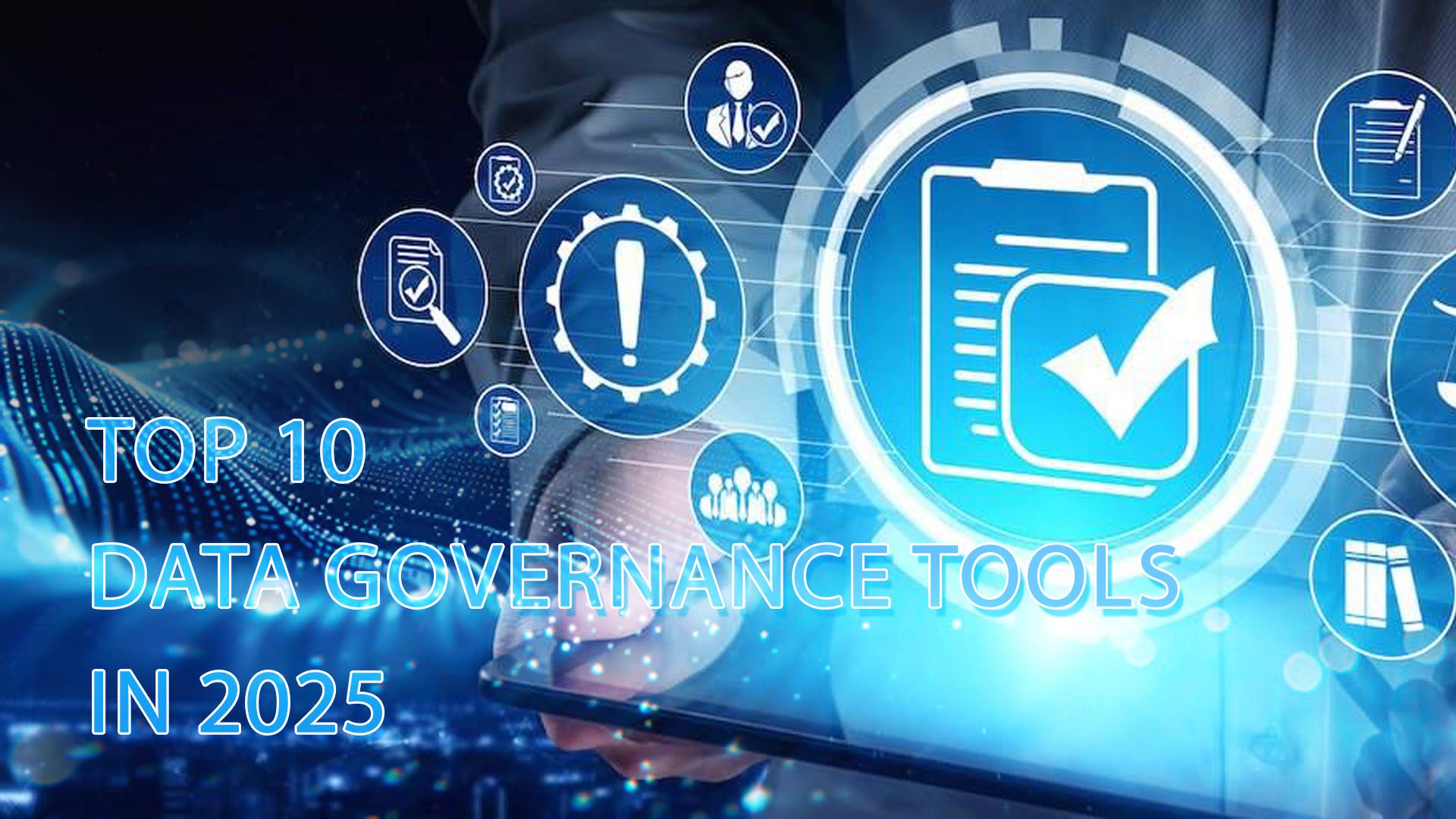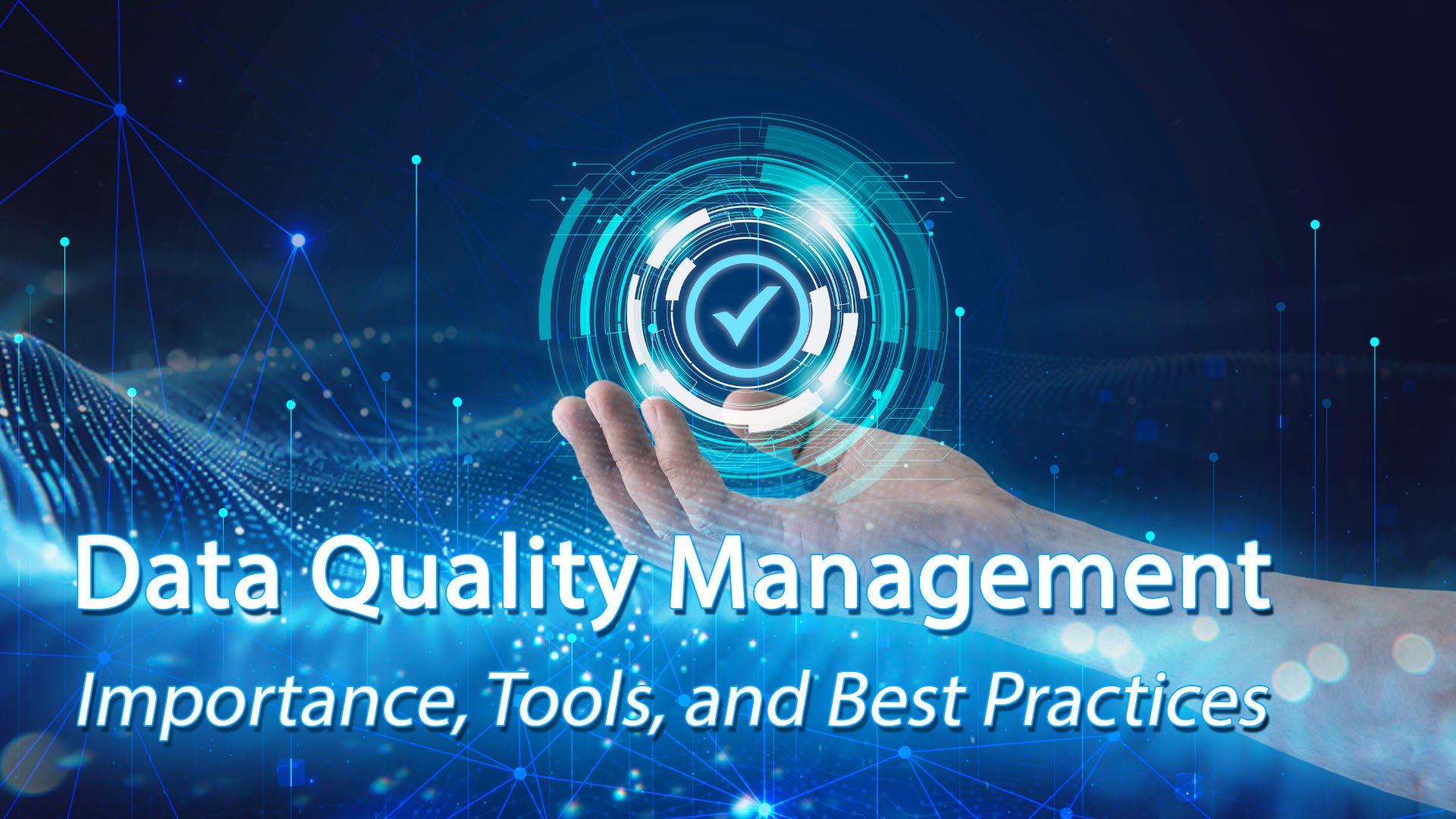Offshore data annotation services are a smart way to scale AI solutions efficiently by leveraging global talent. By working with professional data annotation providers, businesses can reduce costs while maintaining high quality and strong data security. In this article, DIGI-TEXX shares a list of data annotation companies to help you choose the right provider for your AI projects.
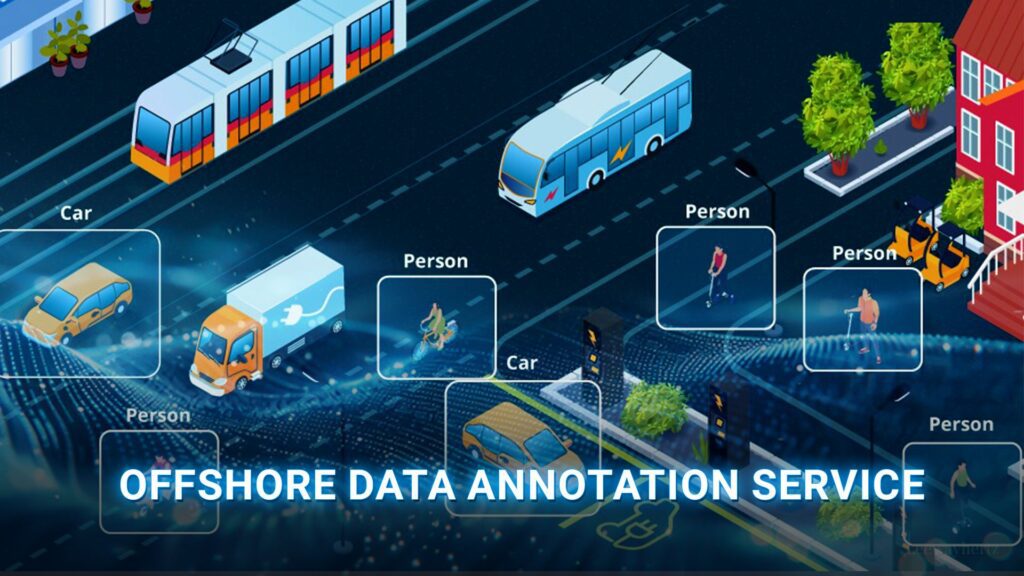
>>> See more:
- In-House vs Outsourced Data Entry: Which One is Right for Your Business?
- Data Entry Outsourcing for Healthcare: Ensuring Accuracy & Compliance
- What Is A Back Office Service? Examples, Benefits, And Cost In 2026
- What are the 6 steps of the data analysis process?
What Is Data Annotation?
Data annotation is the process of labeling and tagging raw data to make it understandable and usable for machine learning algorithms. Think of it as teaching AI systems to recognize patterns by providing them with labeled examples – similar to how a teacher shows students flashcards to help them learn.
In practical terms, data annotation involves humans or AI-assisted tools adding metadata, labels, or tags to various types of unstructured data such as images, videos, text, and audio files.
For example, in an image of a street scene, annotators might draw bounding boxes around cars, label pedestrians, and mark traffic signs. This labeled data then becomes the training material that teaches computer vision models to recognize these objects automatically.
The process is fundamental to supervised learning, where AI models learn from examples. Without properly annotated data, even the most sophisticated machine learning algorithms cannot learn to make accurate predictions or decisions. The quality and accuracy of annotations directly impact the performance of AI models – poor annotations lead to poor AI performance, while high-quality annotations enable AI systems to function reliably in real-world applications.

Why Businesses Outsource Data Annotation?
When AI projects scale from hundreds to millions of data points, having engineers or data scientists handle labeling becomes ineffective. Building an in-house labeling team is costly, management-intensive, time-consuming to train, and diverts senior technical resources from core work. Key reasons to use a third-party service include:
Save Time And Money
This is the most obvious and easily measurable benefit. The company will not need to recruit, train, pay salaries, benefits, and manage a large team of annotators. This cost is especially high in markets like North America and Western Europe. By partnering with an offshore annotation company in a cost-competitive location, businesses can save 40% to 70% on operating costs.
Businesses also don’t need to invest in expensive specialized annotation software licenses, develop in-house tools, and train staff. Professional data annotation service providers already have this entire technology infrastructure in place so they can get started right away.

Higher Quality Thanks To A Professional Team
Businesses will rely on the expertise and experience of data annotation service companies. They always have highly trained teams, experienced in handling millions of data points, and understand complex cases.
In addition, when outsourcing, the Quality Assurance (QA) process is completely organized. For example, data can be annotated by one person, then reviewed by a quality manager, and even randomly checked by senior management. They use the IoU (Intersection over Union) metric to measure accuracy.

>>> See more:
- Understanding the 6 Key Data Quality Dimensions
- How to Automate Documentation in 2026: Step By Step Guide
Flexible Scaling
Outsourcing data labeling gives businesses the flexibility to scale up or down their team almost instantly. If they need to handle a spike in workload, the service provider can add hundreds of people to the project. If the project pauses, you don’t have to worry about maintaining an idle team.
Otherwise, an AI project might start with image annotation, but then expand to video or audio annotation. Instead of having to retrain your entire internal team, a comprehensive data annotation services partner has dedicated teams for each type of data, ready to respond immediately.
Ensure Data Security
AI training data often includes a variety of sensitive data. This could be patient medical records (HIPAA compliant), personal financial data (PCI), facial recognition, or security camera video containing personally identifiable information (PII). Professional service providers will invest heavily in security. They always ensure compliance with top security certifications such as ISO 27001 and GDPR.
In addition, most service providers will use strict access controls in the office (secure, mobile-free work areas), data encryption (both at rest and in transit), use virtual private networks (VPNs), and secure, isolated annotation platforms.
Key Data Annotation Services
Data annotation services label different types of data, such as images, text, audio, and video, to help AI and machine learning models understand real-world information accurately.
1. Image Annotation Services
Image annotation labels objects and regions within images for computer vision models. Common methods include:
- Bounding box annotation for object detection.
- Semantic segmentation for pixel-level labeling.
- Keypoint annotation for facial or body recognition.
- Polygon annotation for irregular object shapes.
- 3D cuboid annotation for autonomous vehicles.
These services support autonomous driving, healthcare imaging, facial recognition, and quality control.
2. Text Annotation Services
Text annotation enables natural language processing by labeling written content. Key tasks include:
- Named entity recognition (NER) to identify names, places, and organizations.
- Sentiment analysis to classify emotions in text.
- Intent detection for chatbots and voice assistants.
- Part-of-speech tagging for linguistic analysis.
- Text classification to categorize documents by topic.
These support customer service automation, content recommendation, and machine translation.
3. Audio Annotation Services
Audio annotation labels sound data for speech recognition and acoustic analysis. Common tasks include:
- Speech-to-text transcription.
- Speaker identification and diarization.
- Emotion detection in voice data.
- Sound event classification for environmental audio.
- Language and accent identification.
These are power virtual assistants, call center analytics, and voice recognition systems.
4. Video Annotation Services
Video annotation tracks movement and events across time. Key methods include:
- Object tracking across frames.
- Action recognition and activity detection.
- Temporal event segmentation.
- Crowd analysis and people counting.
- Multi-object tracking and interaction detection.
These are essential for autonomous vehicles, surveillance, sports analytics, and robotics.
>>> See more:
- Top 10 Data Cleansing Companies for Businesses
- Top 10 Data Entry Outsourcing Companies to Hire in 2026
List Of Data Annotation Companies In The USA 2026
Here’s a curated list of Data labelling companies for 2026, providing high-quality training data for AI across image, text, audio, and video annotation.
1. DIGI-TEXX
Best for: Companies seeking offshore data annotation services to process large volumes of image, video, and text data with high accuracy and flexible tools.
DIGI-TEXX provides outsourced data annotation services designed to support AI and Machine Learning model training. The company focuses on labeling and annotating structured and unstructured data, helping businesses turn raw datasets into reliable training data.
With a team of specialized data annotators and an experienced crowdsourcing workforce, DIGI-TEXX can manage projects of any size or complexity while maintaining consistent quality. Its workflows combine human expertise with AI-assisted tools to improve efficiency and accuracy.
DIGI-TEXX supports image, video, and text annotation, including multilingual text labeling and transcription. Projects can be delivered on the client’s existing systems or on DIGI-TEXX’s annotation platforms, making it suitable for companies with specific technical or security requirements.
Standout Features: Flexible annotation workflows, AI-assisted labeling tools, multilingual text annotation, and the ability to scale annotation teams quickly.
Pros:
- Handles high-volume data annotation projects efficiently.
- Supports multiple data types: image, video, and text.
- Flexible tooling options (client system or DIGI-TEXX platform).
Cons: May not be ideal for teams looking only for self-service annotation software.

2. 1840 & Company
Best for: U.S. companies that need outsourced data annotation services and want a reliable partner to build, manage, and scale global annotation teams with full workforce support.
1840 & Company provides offshore data annotation service through a people-first model. With access to vetted professionals in over 150 countries, the company supports image, video, audio, and text annotation for a wide range of AI and machine learning projects.
Instead of offering only an annotation platform, 1840 & Company handles the entire workforce process, including hiring, training, payroll, compliance, and team scaling. This allows businesses to focus on AI development while the annotation operations are managed end to end.
The company works across multiple industries and supports various AI use cases, from NLP to 3D point cloud labeling. Its proprietary AI-powered Talent Cloud helps quickly vet and match businesses with suitable annotation professionals, usually within two weeks, making it suitable for both short-term and long-term projects.
Standout Features: A proprietary AI-powered Talent Cloud for fast vetting and accurate talent matching. Strong expertise across all major data types, including image annotation services, video data annotation, audio data labeling, and document processing.
Pros:
- Access to vetted annotation professionals in more than 150 countries.
- Helps reduce costs by up to 70% while maintaining labeling accuracy and quality.
- Manages payroll, compliance, and HR in addition to annotation work.
Cons:
- Not a niche, tool-only annotation provider, as it focuses more on workforce flexibility.
- May not be suitable for companies looking for a pre-built annotation tool only, such as Labelbox.
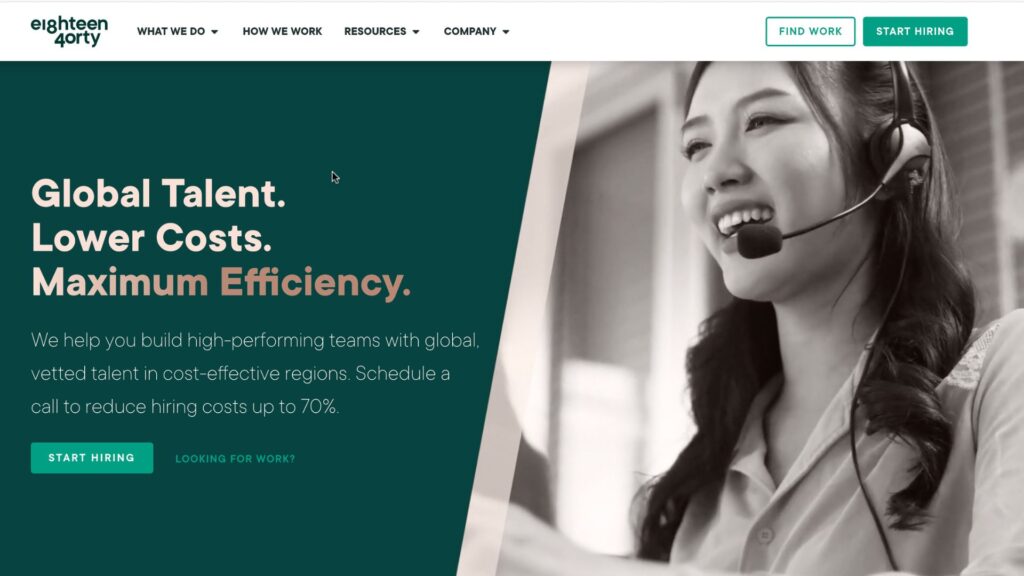
3. Scale AI
Best for: Businesses with highly specialized image and video annotation projects where accuracy and precision are more important than large-scale volume.
KeyMakr is a US-based data annotation company specializing in high-precision, customizable labeling for computer vision projects, offering services like segmentation, object detection, and video annotation with a human-in-the-loop approach.
KeyMakr is commonly chosen by companies that require high-quality training data for AI and machine learning models in industries such as retail, smart home technology, and security, where attention to detail directly impacts model performance.
Standout Features: Strong customization capabilities for complex data types, including 3D point cloud labeling and pixel-level image segmentation.
Pros:
- Known for meticulous and accurate annotation services.
- Ideal for small to mid-scale projects with detail-heavy requirements.
- Flexible annotation workflows that can be customized to client needs.
Cons:
- Limited scalability compared to enterprise-level providers like Scale AI or iMerit
- Primarily focused on computer vision, making it less suitable for NLP- or audio-heavy projects.
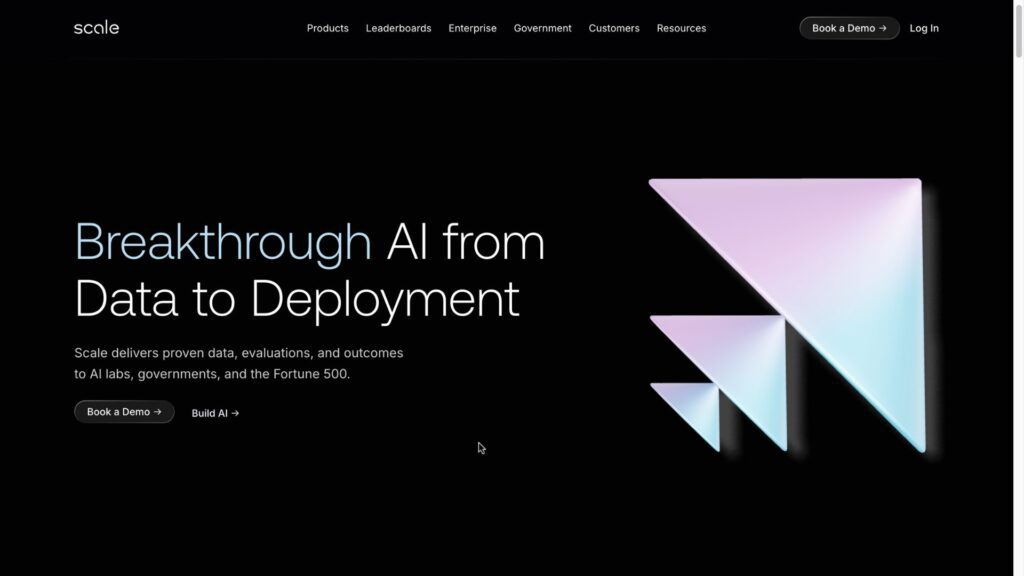
>>> See more:
- An Overview of Document Processing Company: What You Need to Know
- Best Insurance Claims Processing Outsourcing BPO in the US 2026
4. Surge AI
Best for: AI labs and NLP-focused startups that need reliable support for text-heavy projects and natural language processing tasks.
Surge AI is a popular partner for teams building large language models and conversational AI systems. Unlike general vendors, Surge AI focuses mainly on text-based work, making it a strong option for companies looking for offshore data Annotation services focused on text annotation, keyword tagging, and reinforcement learning from human feedback (RLHF).
These services help improve how chatbots, virtual assistants, and generative AI systems understand and respond to user input. Surge AI’s annotators are trained to handle language nuance, making the company especially effective for sentiment analysis and entity recognition tasks.
Standout Features: Strong specialization in text annotation and NLP labeling, including advanced RLHF for AI and machine learning models.
Pros:
- Deep expertise in NLP and conversational AI.
- A strong partner for companies developing generative AI and large language models.
- Able to scale text annotation and review teams quickly.
Cons:
- Primarily focused on language-based tasks, so less suitable for large-scale image or video annotation projects.
- Reliance on contractor networks may raise concerns about long-term workforce consistency.
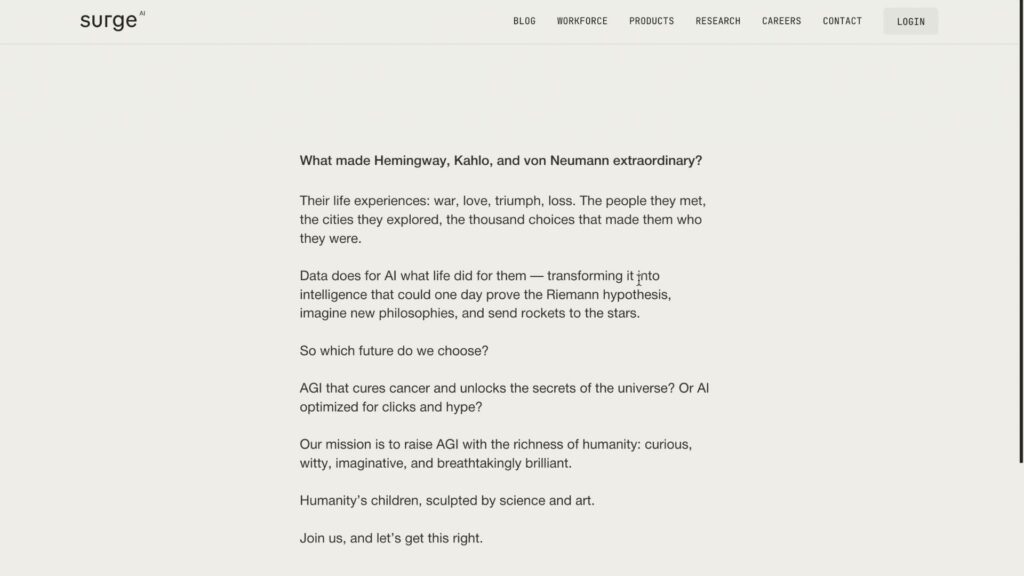
5. Sama
Best for: Companies looking for reliable offshore Data Annotation services while working with an ethical and socially responsible provider.
Sama (formerly Samasource) is a well-known company in the data annotation space, recognized for combining technical expertise with responsible workforce practices. As a Certified B Corp, Sama focuses on creating stable job opportunities in underserved communities, especially in Africa, while delivering high-quality annotation services to global clients.
Sama provides outsourced data annotation services across multiple data types, including image, video, audio, and text annotation. The company is particularly strong in computer vision projects such as object detection, object tracking, and 3D point cloud labeling, supporting AI teams that require accurate and reliable training data.
Sama works with fast-growing industries like autonomous vehicles and robotics, where data quality and consistency are critical. The company places strong emphasis on ethical labor standards, proper training, and long-term workforce development, making it a suitable partner for enterprises that value both performance and responsible sourcing.
Standout Features: Strong expertise in video annotation services, image annotation services, and AI data annotation services for high-growth industries such as autonomous vehicles and robotics.
Pros:
- Well-known for ethical outsourcing and responsible workforce practices.
- Able to scale data annotation projects across image, video, audio, and text data.
- A good fit for enterprises that value both data quality and social responsibility.
Cons:
- Has faced past scrutiny related to working conditions in certain content moderation and annotation projects.
- Pricing may be higher than some low-cost providers due to investments in training and ethical standards.
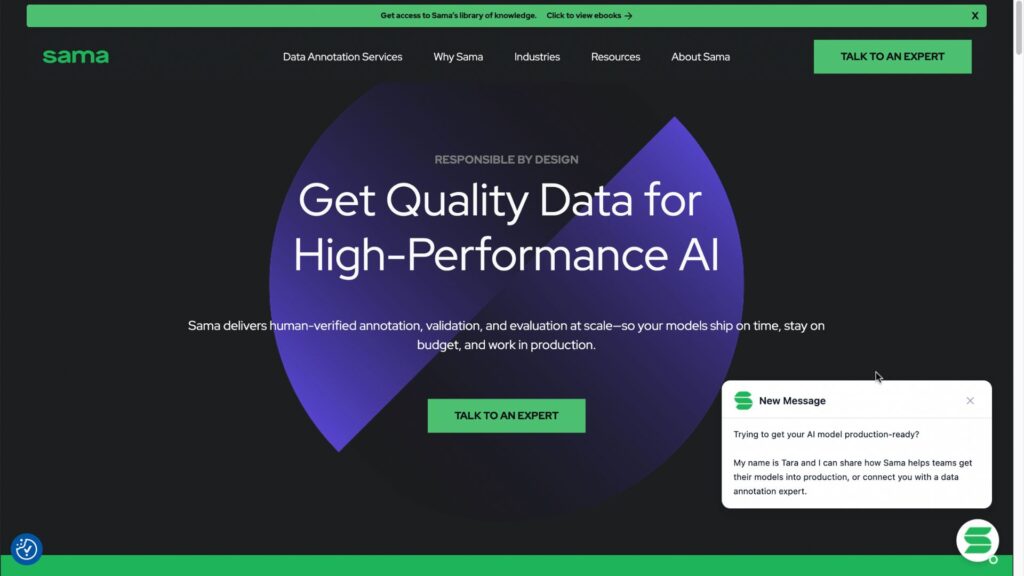
6. iMerit
Best for: Enterprises operating in highly regulated or accuracy-driven industries such as healthcare, autonomous driving, and financial services.
iMerit is a well-established provider of offshore data annotation services, known for handling complex and highly regulated datasets. The company offers trained teams capable of handling image, video, text, and audio annotation, making it a trusted partner for projects where precision and compliance are critical.
iMerit is commonly used in sectors like medical imaging, autonomous vehicles, and financial services – industries that demand strict quality control, regulatory compliance, and highly accurate labeling to ensure safety and reliability.
Standout Features: Advanced annotation capabilities for computer vision models, including 3D point cloud labeling and semantic segmentation, making iMerit a reliable choice for large-scale and high-complexity AI projects.
Pros:
- Strong track record working with Fortune 500 companies and leading tech firms.
- Specializes in high-risk annotation projects where accuracy directly affects safety or compliance.
- Scalable annotation solutions across multiple data types, supported by global delivery centers.
Cons:
- Higher pricing compared to some providers, reflecting its specialization and quality standards.
- May feel too complex or resource-heavy for early-stage startups with smaller annotation needs.
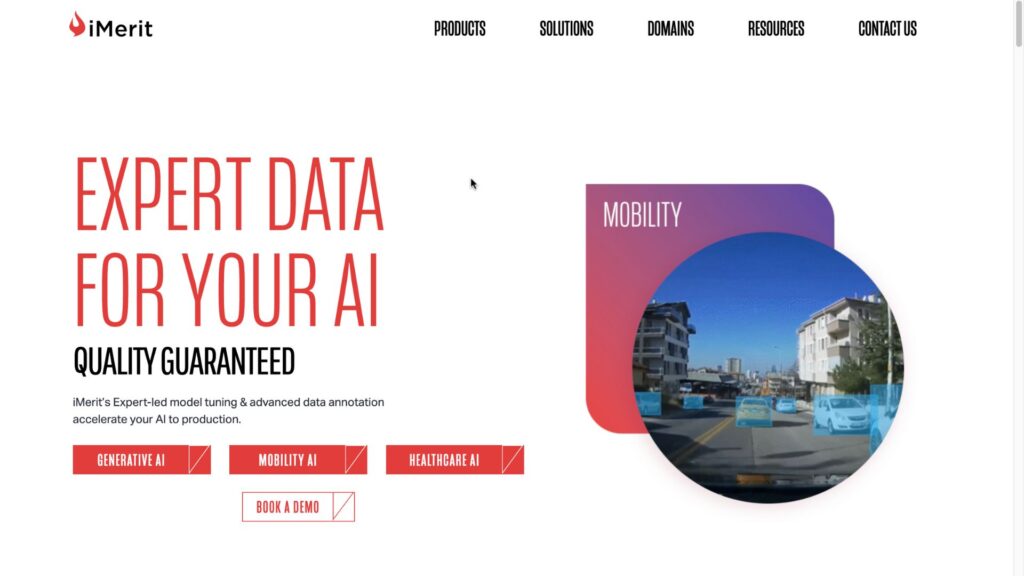
>>> See more:
- Professional Fashion Photo Editing Services for Stunning Visuals
- Outsourcing Data Management: Benefits, Services & Best Practices
7. Playment (TELUS Digital)
Best for: Enterprises that need high-volume image and video annotation projects, especially in autonomous driving and retail.
Playment, now part of TELUS Digital, is a well-known provider of offshore data annotation services and is recognized as one of the top data annotation companies for its strong focus on computer vision. The company built its reputation by delivering image annotation, video annotation, and 3D point cloud labeling for industries such as autonomous vehicles, robotics, and retail analytics.
After joining TELUS Digital, Playment gained access to a global workforce and enterprise-level infrastructure. This allows the company to handle large-scale annotation projects and deliver high-quality training data faster, making it a good fit for enterprises with tight timelines.
Playment is especially strong in visual data annotation tasks, helping AI teams improve model performance while maintaining consistent quality at scale.
Standout Features: Deep expertise in object detection, object tracking, semantic segmentation, and bounding box annotation. Integration with TELUS Digital provides global delivery capabilities, along with enterprise-grade security and compliance.
Pros:
- Strong expertise in computer vision and 3D annotation.
- Backed by TELUS Digital’s global scale and infrastructure.
- Good balance between accuracy and scalability for large AI projects.
Cons:
- May feel less flexible for smaller clients due to corporate processes.
- Mainly focused on vision-based annotation, with limited support for text or audio data.
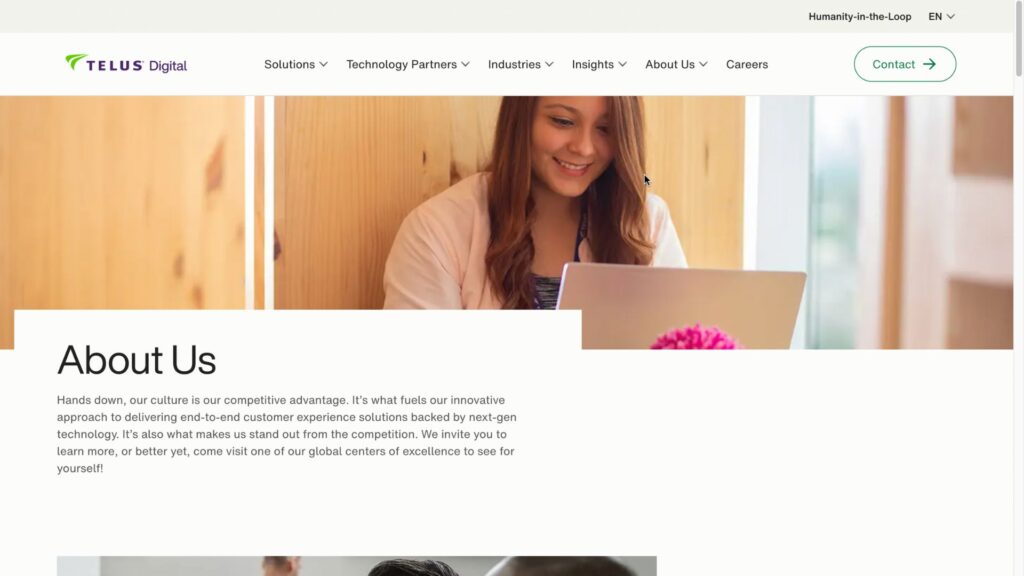
8. KeyMakr
Best for: Businesses with highly specialized image and video annotation projects where accuracy is more important than volume.
KeyMakr is a specialized provider of outsourced data annotation services, focused on delivering highly accurate labeling for computer vision projects. Unlike large, general-purpose vendors, KeyMakr emphasizes customization and data quality. The company handles tasks such as semantic segmentation, bounding boxes, object detection, and video annotation using a human-in-the-loop approach to ensure precision.
KeyMakr is often chosen by companies that need high-quality training data for AI and machine learning models, particularly in industries like retail, smart home technology, and security – where small details can have a major impact on model performance.
Standout Features: Strong customization capabilities for complex data types, including 3D point cloud labeling and pixel-level image segmentation.
Pros:
- Known for careful, accurate labeling and annotation services.
- A strong fit for small to mid-sized projects with detailed requirements.
- Flexible annotation workflows that can be tailored to specific client needs.
Cons:
- Limited scalability compared to enterprise-level providers such as Scale AI or iMerit.
- Primarily focused on computer vision, making it less suitable for large NLP or audio annotation projects.
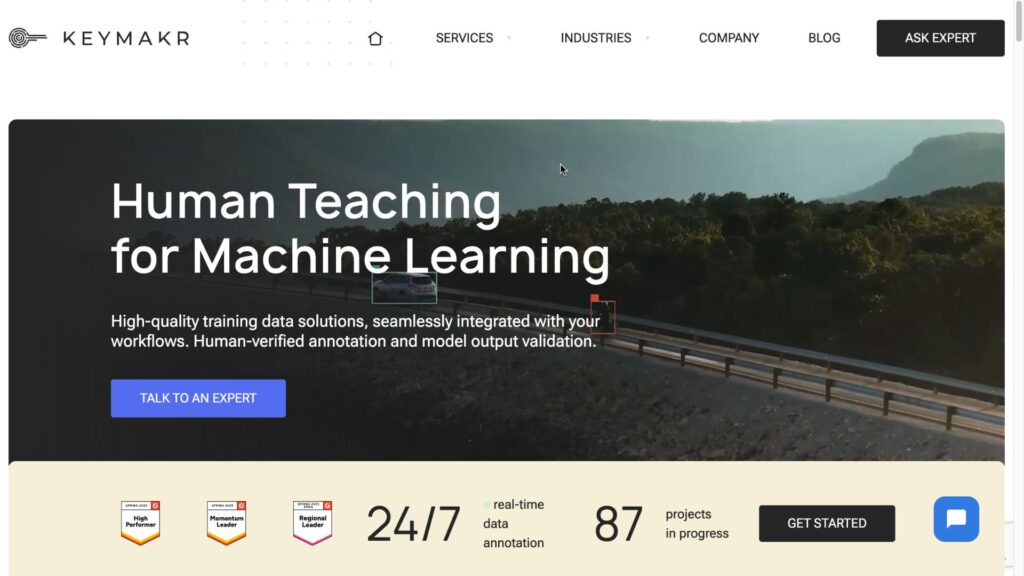
9. Turing
Best for: Companies that need domain experts for complex or sensitive data annotation projects, rather than large-scale, generic annotation work.
Turing is widely known as a global talent marketplace for remote engineers. In response to growing demand for AI training data, the company has expanded into offering outsourced data annotation services through a talent-driven model.
Instead of operating like a traditional annotation provider, Turing focuses on connecting businesses with vetted annotation professionals who can handle complex and specialized tasks. This approach gives companies direct access to skilled human talent, rather than relying only on fully managed annotation services.
Standout Features: A talent-first model that emphasizes domain expertise and accurate skill matching, making Turing suitable for annotation tasks beyond basic image annotation.
Pros:
- Access to vetted experts for specialized AI data annotation projects.
- Flexible engagement model that allows teams to scale up or down quickly.
- Well-suited for tasks that require human judgment and domain-specific knowledge.
Cons:
- Not a fully turnkey annotation service provider like Sama or iMerit.
- Best suited for companies willing to manage annotation workflows more directly rather than fully outsourcing them.
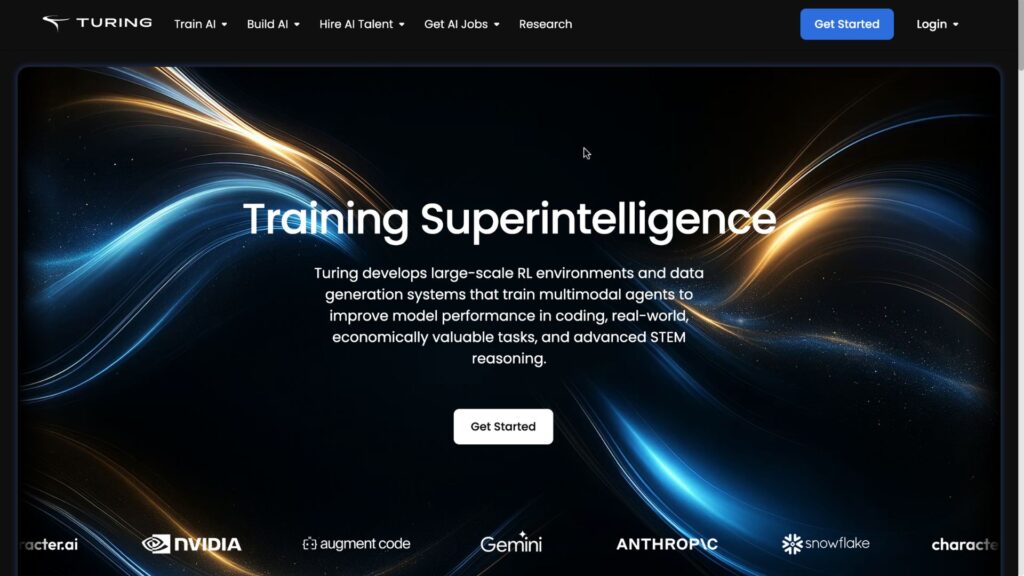
alt: Turing expertise
>>> See more:
- Construction Invoice Reconciliation: Best Practices, Software & Outsourcing
- Top 10 Outsourced AI Training Data Companies in 2026
10. Label Your Data
Best for: Companies in regulated industries that need high-quality training data with strict security and compliance requirements.
Label Your Data is a boutique provider of outsourced data annotation services, focused on delivering secure, scalable, and customizable annotation solutions. The company is trusted to handle sensitive raw data, including healthcare images, financial records, and government information, thanks to its strong compliance and information security practices. Label Your Data is recognized as one of the best data annotation companies to work for, making it a reliable choice for businesses seeking secure and precise annotation services.
Label Your Data supports image, video, text, and audio annotation, making it suitable for a wide range of industries. What sets the company apart is its commitment to data protection throughout the entire annotation pipeline, from data intake to final delivery.
In addition, Label Your Data places strong emphasis on regulatory compliance, including GDPR, and offers tailored workflows to meet specific AI data annotation requirements.
Standout Features: Strong focus on security and compliance, including GDPR adherence, along with customized workflows for AI data annotation services.
Pros:
- Strong compliance standards, including ISO/IEC 27001, PCI DSS, and GDPR.
- Flexible engagement models for different annotation projects.
- Delivers secure annotated datasets across image, video, text, and audio.
Pros:
- Smaller scale compared to large annotation providers like Appen or iMerit.
- Best suited for projects where security and precision matter more than high-volume cost optimization.
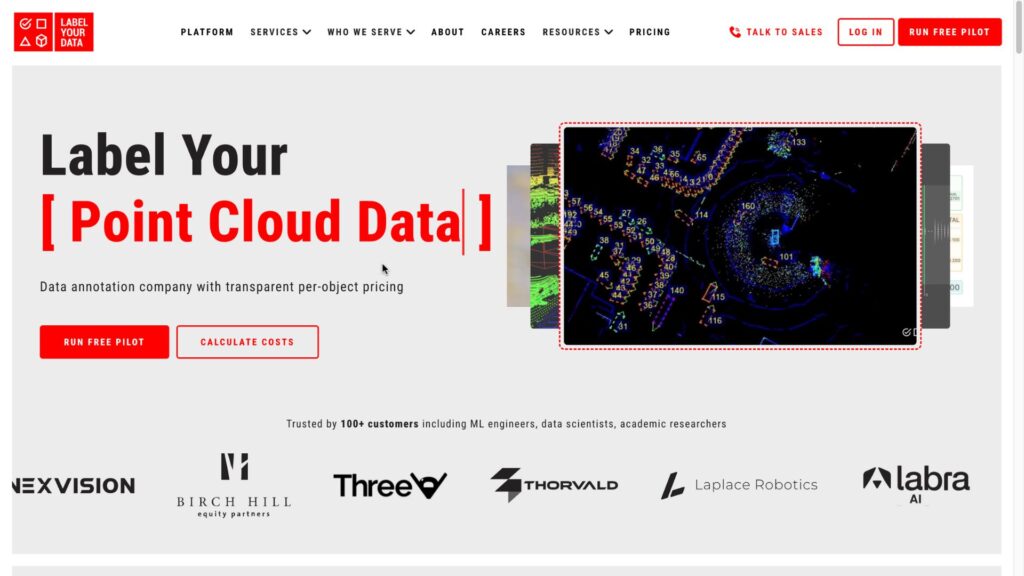
11. Encord
Best for: AI teams working with multimodal data (images, video, DICOM, text, audio) who need enterprise-grade annotation tools with advanced quality control and model evaluation capabilities.
Encord stands out as a comprehensive data annotation platform designed specifically for enterprise AI teams building production-grade models. Unlike traditional annotation services that focus solely on labeling, Encord provides a full-stack solution that encompasses data management, annotation, quality assurance, and model evaluation – all integrated into a single platform.
The platform excels at handling multimodal data types, supporting images, videos, audio, text, documents, DICOM medical imaging, 3D data, and point clouds. This versatility makes Encord particularly valuable for organizations working on complex AI projects that involve multiple data types, such as autonomous vehicles (combining camera, LiDAR, and radar data) or healthcare applications (integrating medical images with patient records).
Standout Features: Encord offers model-assisted labeling with SAM, advanced video annotation tools, customizable multi-stage workflows, and real-time performance dashboards, along with strong GDPR, SOC 2, and HIPAA compliance for regulated industries.
Pros:
- Comprehensive platform supporting the entire ML lifecycle from annotation to model evaluation.
- Enterprise-grade security with SOC 2, HIPAA, and GDPR compliance.
- Handles massive scale: up to 500,000 images, 100 GB per project, and 5 million labels.
- Strong integration capabilities with AWS, Google Cloud, Azure, and Open Telekom Cloud.
- Excellent for complex use cases in medical imaging, autonomous vehicles, and physical AI.
Cons:
- May be overly comprehensive for simple annotation tasks or small-scale projects.
- Pricing positioned at the enterprise level, which may not suit startups with limited budgets.
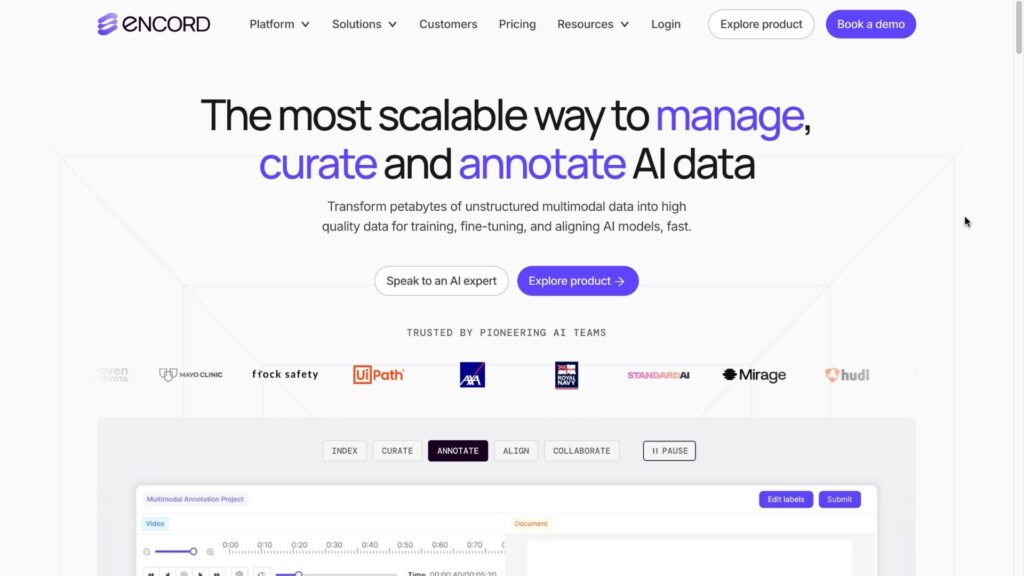
12. TaskUs
Best for: Enterprises requiring large-scale, secure annotation operations with dedicated teams working in controlled facilities, particularly for sensitive or regulated data projects.
TaskUs brings a unique approach to data annotation by leveraging its extensive background in Business Process Outsourcing (BPO) and content moderation. Originally established as a BPO company known for customer support and content moderation services, TaskUs has evolved into a major player in AI data annotation, particularly for clients who need secure, scalable, and enterprise-friendly annotation services.
As a publicly-traded company with global operations spanning 20+ countries, TaskUs operates dedicated delivery centers staffed by tens of thousands of trained professionals. This infrastructure allows them to provide managed annotation teams for hire, similar to how traditional BPOs offer call center services, but specifically tailored for AI training data needs.
Standout Features: TaskUs stands out for its secure, controlled annotation environments with strict physical and data security, making it ideal for sensitive datasets. It offers comprehensive annotation services across images, 3D LiDAR, text, audio, and video.
Pros:
- Enterprise-scale operations with ability to quickly deploy 100+ dedicated annotators for long-term projects
- Strong security and compliance credentials (SOC2, ISO certifications) ideal for regulated industries
- Experienced in handling highly sensitive content through their content moderation background
- Dedicated project management with account managers and team leads ensuring quality KPIs
Cons:
- Higher pricing due to full-time employee and project management model.
- Larger minimum project commitments required.
- Limited focus on proprietary annotation technology.
Clients may need to provide or specify annotation tools.
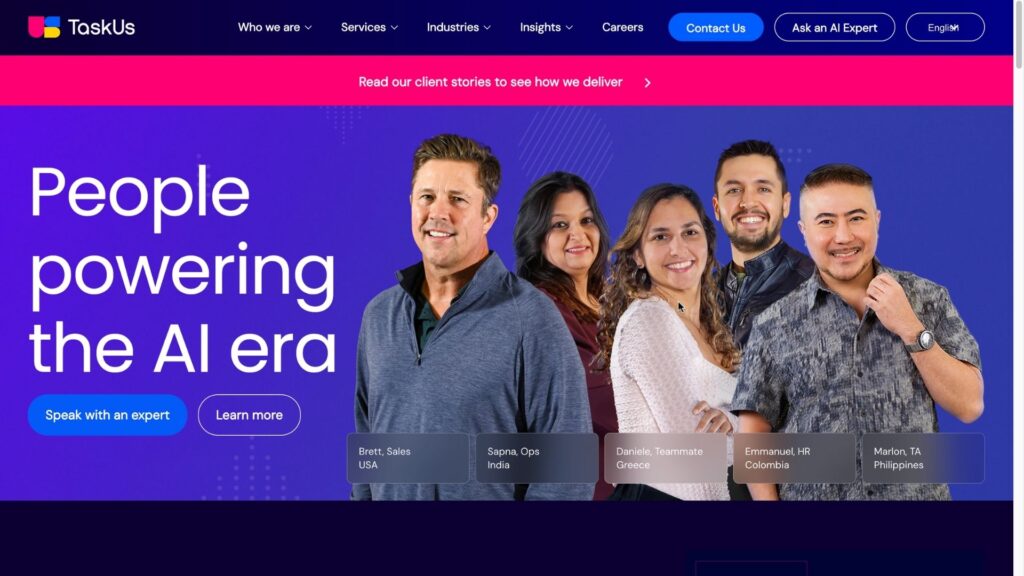
>>> See more:
- What Is Business Process Outsourcing (BPO)? Definition & Benefits
- Business Process Automation Solutions: Benefits, Example & Service Company
Why Data Annotation Is Critical For AI Success
Professional data annotation services are the core foundation when implementing projects applying Artificial Intelligence (AI) and Machine Learning. It can be seen that, in the digital era, data is an important asset, but raw data itself is worthless if not processed well. This is where the role of data annotation becomes important.
A specific example, when training an AI model to detect tumors in medical X-ray images. Without proper annotation (localization and labeling of ‘tumor’ or ‘normal’), the AI model will not be able to distinguish between healthy tissue and signs of disease. Similarly, a self-driving car needs pixel-by-pixel labeled video data (semantic segmentation) to differentiate between ‘roads’, ‘pedestrians’, ‘other vehicles’ and ‘obstacles’.
In order for AI models to make accurate decisions, they need to be trained on a huge dataset that has been carefully, accurately and consistently labeled. The quality of the ground truth will directly affect the performance, reliability and fairness of the AI model. A poorly annotated dataset will lead to a poorly performing AI model, causing wasted resources and even serious real-world consequences.
How to Choose the Right Data Annotation Partner
The offshore data annotation service market is booming, but not all providers are truly good. Choosing the wrong partner can lead to poor quality data, wasted months of AI development effort, and security risks. That’s why businesses should carefully evaluate top data annotation companies based on the following criteria before making a decision:
Quality and QA Process
This should be your top priority. Don’t just believe the 99% accuracy claim. Ask specifically: How does your QA process work? Do you use a single-layer or multi-layer testing model? What metrics do you measure quality with (e.g., IoU, F1-score)? A reputable provider will be willing to conduct a free or low-cost pilot project so you can directly evaluate the quality of the output.
Security & Compliance
Ask for proof of security certifications. Is it ISO 27001 certified? How is it GDPR compliant? Ask about specific security measures: Will company data be encrypted? Are employees allowed to bring personal devices into the work area? How do you handle PII data?
Scalability and Human Resources
Ask about the actual size of their team. How many full-time annotators do they have? How many data points did they handle the largest project? How long would it take them to double the size of their team for a project if needed? A good partner should be able to flexibly scale to your business needs.
Technology & Tools
Some vendors use in-house software, while others use commercial tools. Important: Do their tools support the complex types of annotations you need? Are they flexible to work on their own platform if required? The best data annotation companies often use ‘AI-assisted annotation’ to increase speed and reduce costs.
Domain Expertise
Labeling medical data is very different from labeling self-driving cars. Ask them if they have experience in the same field as you. Having domain expertise helps them understand the context and significantly reduces errors, especially when dealing with new and difficult cases.
Communication & Support
When choosing an offshore annotation company, effective communication is very important. Is there a dedicated Project Manager? How often are they reporting and how transparent are the quality metrics?
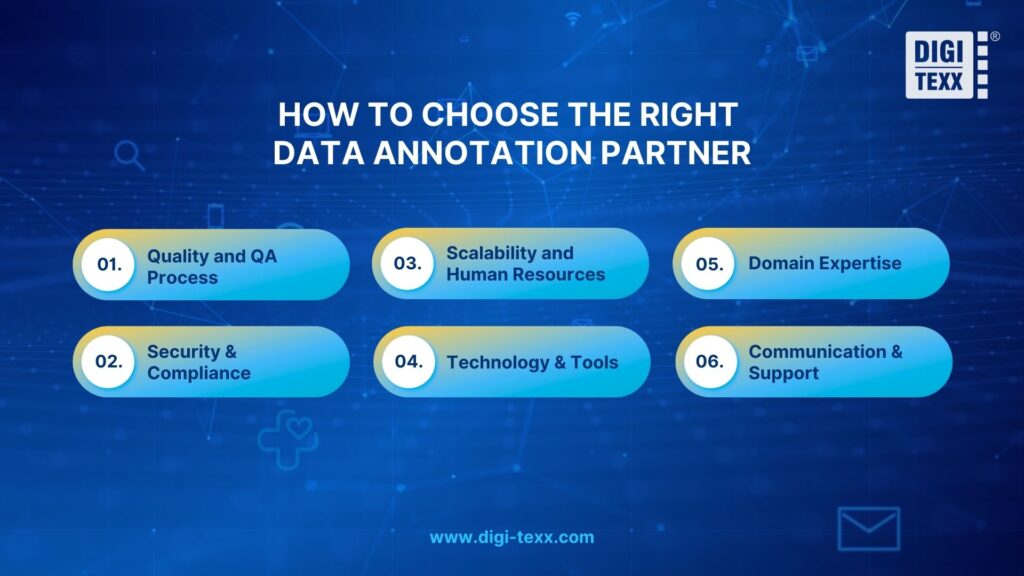
>>> See more:
- How To Prepare a Classified Balance Sheet: Template & Example
- Data Quality Assurance: What It Is and Best Practices
Why Choose Offshore Data Annotation Services At DIGI-TEXX?
When comparing Top data annotation companies, businesses are not just looking for a vendor, but a reliable long-term partner who can deliver consistent quality, protect sensitive data, and scale as AI projects grow. DIGI-TEXX meets these expectations through proven experience, strong quality control, and a flexible delivery model tailored to real-world AI development needs.
- Proven expertise in large-scale data annotation projects: DIGI-TEXX has extensive experience handling millions of data points across image, video, text, and audio annotation for AI and Machine Learning.
- Strict multi-layer QA/QC process: Every dataset is reviewed through multiple quality control stages to ensure high accuracy and consistent results.
- Cost-effective offshore delivery model: Our offshore annotation teams help businesses significantly reduce operational costs without compromising data quality.
- Advanced annotation tools and AI-assisted workflows: We use modern annotation platforms combined with AI-assisted labeling to improve speed, accuracy, and scalability.
- Strong data security and compliance: DIGI-TEXX follows strict security protocols and complies with international data protection standards to safeguard sensitive and confidential data.
- Flexible scalability to support growing AI projects: Our large, well-trained workforce allows us to quickly scale resources up or down based on project requirements.
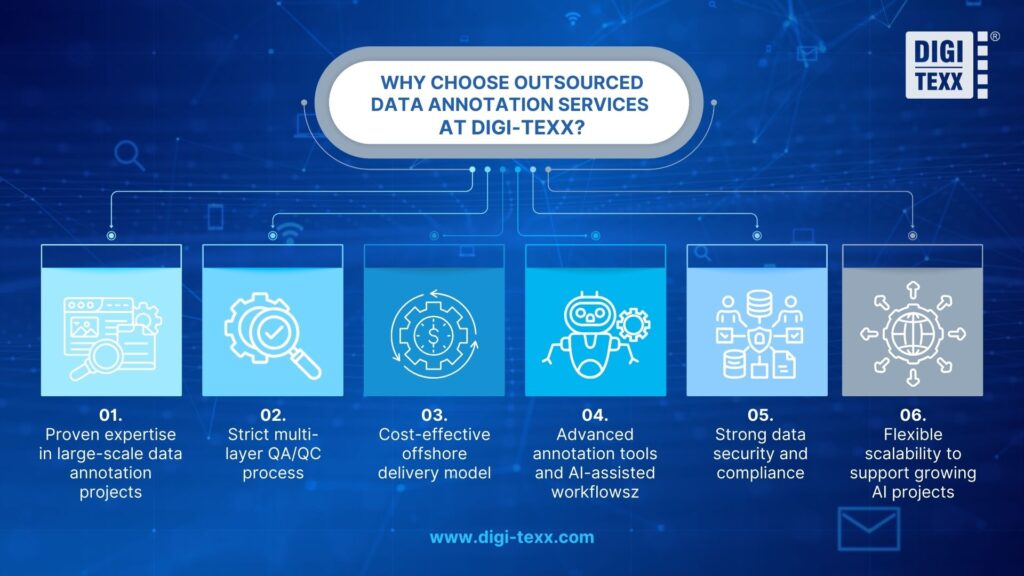
FAQs About Offshore Data Annotation Service
Can AI Be Used In Data Annotation Technology?
The answer is Yes. AI tools can support data annotation by automating tasks like bounding boxes, semantic segmentation, and text labeling. However, human review is still essential to ensure accuracy, contextual understanding, and high-quality training data for AI models.
What Are The Top 5 Data Annotation Companies?
List of 5 data annotation companies you should consider: DIGI-TEXX, 1840 & Company, Scale AI, Surge AI, and Sama.
Choosing the right offshore Data Annotation service provider is a strategic decision that directly impacts your AI model’s performance, development timeline, and overall project costs. DIGI-TEXX combines technical expertise, proven annotation methodologies, and enterprise-grade security to deliver accurate, scalable data labeling solutions tailored to your specific AI requirements.
Whether you’re developing computer vision models, natural language processing applications, or speech recognition systems, our offshore Data Annotation service ensures your AI projects are built on reliable, professionally annotated datasets. With flexible engagement models, transparent quality metrics, and dedicated project management, we help you accelerate AI development while maintaining full control over quality and compliance.
If you have any questions or would like expert advice on data analytics services, please feel free to contact us using the information below.
DIGI-TEXX Contact Information:
🌐 Website: https://digi-texx.com/
📞 Hotline: +84 28 3715 5325
✉️ Email: [email protected]
🏢 Address:
- Headquarters: Anna Building, QTSC, Trung My Tay Ward
- Office 1: German House, 33 Le Duan, Saigon Ward
- Office 2: DIGI-TEXX Building, 477-479 An Duong Vuong, Binh Phu Ward
- Office 3: Innovation Solution Center, ISC Hau Giang, 198 19 Thang 8 street, Vi Tan Ward
